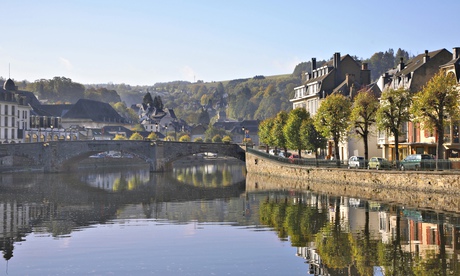
Less evasive than WG Sebald (whose narratorial persona seems to evaporate out of his foggy books like the figure of Krook in Dickens), and not as brilliantly mannered as Bruce Chatwin, Other People's Countries nevertheless comes out of the Sebald/Chatwin corner of things: a personal-factual, poetical-anthropological, fugitive-material, reminiscential-speculative work, written in pyrrhic paragraphs that flirt with metaphysics, and loosely illustrated with pessimistic (and of course uncredited) black-and-white photographs.
Patrick McGuinness teaches 19th-century French literature at Oxford. He has published a novel (The Last Hundred Days) set in Romania around the fall of Ceausescu and a couple of well-regarded books of poems, and now offers a book of 62 – what to call them? – reflections? sidelights? aspects? miniatures? of Bouillon, the small town in Walloon Belgium where he spent part of his childhood, and which he still visits several times a year with his own wife and children.
In the course of the last 50, 70, 100 years, it's as though the cell walls of life have been broken down. People don't stay where they're put, they aren't content with what their parents and grandparents were content with, they have messy – and largely identical – aspirations, expectations and horizons, and are as emulously aware of strangers as they are oblivious to themselves. This is globalisation: the relatively unhindered movement of objects, people and information.
We are taught to think of it as a great enrichment – and indeed, it has led to many goods becoming available and sometimes affordable, and also to a kind of impertinent aggression and self-assertion in the way we carry ourselves. But perhaps what it is instead, or as well, is a great levelling. Everywhere in the world, more or less, aspires to the condition of Brooklyn, sometimes successfully. Our high streets are near-identical (and everywhere is a high street), and we are all customers waiting to be befriended via our smartphones by things we happen not yet to own. Our imputed interests and wants trawl unsleeping through the entire brandmarked world. Ownership – cupidity – is the unchallenged model of all our transactions.
Nothing seems so phantasmally, so irretrievably gone as what was once the small, the local, the provincial. (It's the what-is-there, as opposed to the what-we-might-have.) First, cities applied their chemical and vacuum pressure to footloose rural populations, then countries and whole continents did. Bouillon, to McGuinness, is a memory of eccentric intactness, the small town of a couple of thousand people wrapped in a tributary of the Meuse. It might almost be Pompeii.
Everything about Bouillon enjoins or expresses separation: the garage at the town's edge, beyond which is only the cemetery – an eloquent commentary on the futility of going anywhere. The local breakfast of trempinette – day-old bread, reheated coffee, butter and sugar – that surely won't survive the global culture of myriad breakfast cereals and chai lattes. The grandfather, described as an "anti-raconteur in a world of exaggeration". The shops that were just temporarily alienated front rooms. The plaque that pathetically announces "Ici joua Paul Verlaine" – Verlaine played here. "The cafe that was full of advertisements for those drinks that even then no one really drank, but which somehow define the sophistication of drinking: Mandarine Napoleon, Pisang, Maitrank, Dubonnet, Suze."
Everything is a kind of dead-end: it is as it is, it doesn't conduct, doesn't open, doesn't lead. Paris doesn't exist, Brussels doesn't exist, even Namur barely exists; meanwhile, the dresses sewn by McGuinness's grandmother are described as "good enough for Brussels" or "good enough for Paris". There are Morocco, Algeria, Congo, Abyssinia, but they are all places in Bouillon. The form of Walloon French, lovingly and resourcefully transcribed by McGuinness, is severely local. "Ne ni les léchi greyi" is "don't let them burn". People say things in Bouillon that they say nowhere else. Or they say things such as "pisser dans ses frites" that it seems were originally said in English, and by McGuinness's Tyneside Irish father. They lead back to a kind of unreality. A brief, false trail. The plenitude of a knotted condom.
The original form is the paradox, or maybe the conundrum. The local newspaper "slack with news"; the recess with the stolen saint (has anyone noticed?); the suit whose highlight is its doublure, its lining; the two competing Trappist beers, one Flemish, one Walloon, because "here in Belgium, even a Trappist must choose the language in which to keep silent". A few miles away, in Corbion, they had a tradition of growing tobacco, then they built a "Musée du Tabac"; "you commemorate what you are doing," notes McGuinness, "until, little by little, doing it becomes itself the commemoration". Bingo, the economy of post-production.
McGuinness has written the great book on Belgium and modern memory, or even Belgium and modern being. He takes his place among those singers and painters of the haunted, the melancholy, the diminished, the caricatural, the humdrum: Ensor, Rodenbach, Sax, Huysmans, Simenon and Magritte. Throw in too a couple of distinguished visitors, Baudelaire (who in 1864 projected a screed called Pauvre Belgique!) and Rilke, whose medieval interiors and modern physics bring him into the arena of permanent dissolution. But the last word should go to McGuinness. Here he is, in the old Quartier Léopold of Brussels, knocked down "to make room for the glass and steel buildings of Euroland": "There are no Bruxellois left in the area, and when I was last there I felt like the only Belgian, perhaps even the last Belgian. Being only half-Belgian does not disqualify me from the slightly adrift sense of belonging that constitutes Belgitude, because all Belgians are only half-Belgian."

